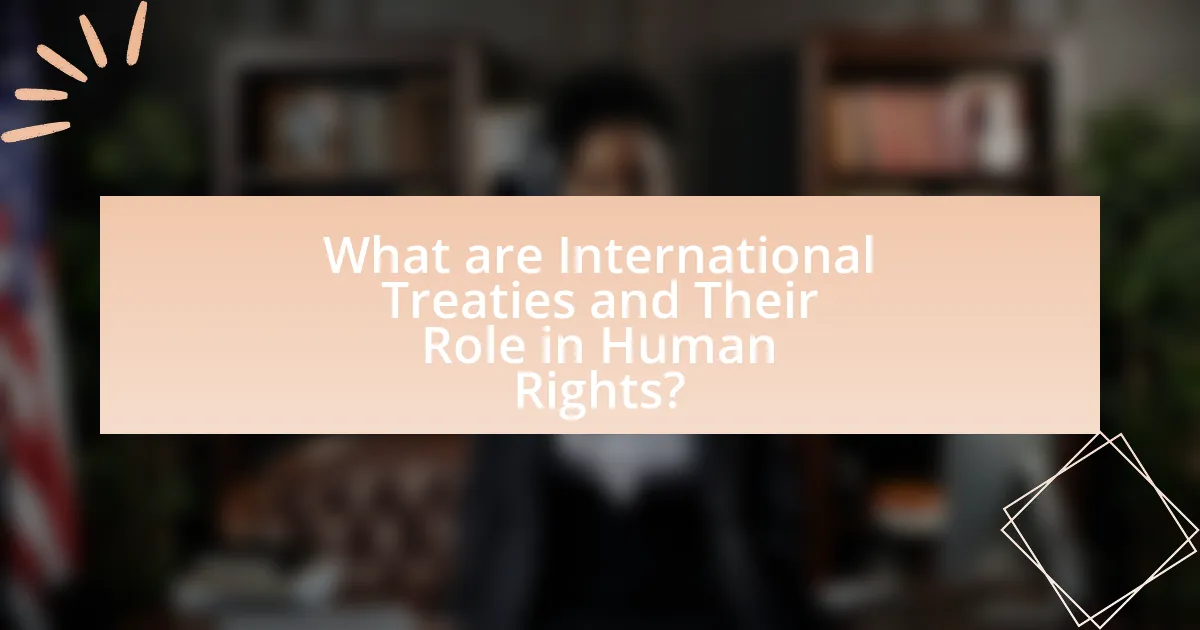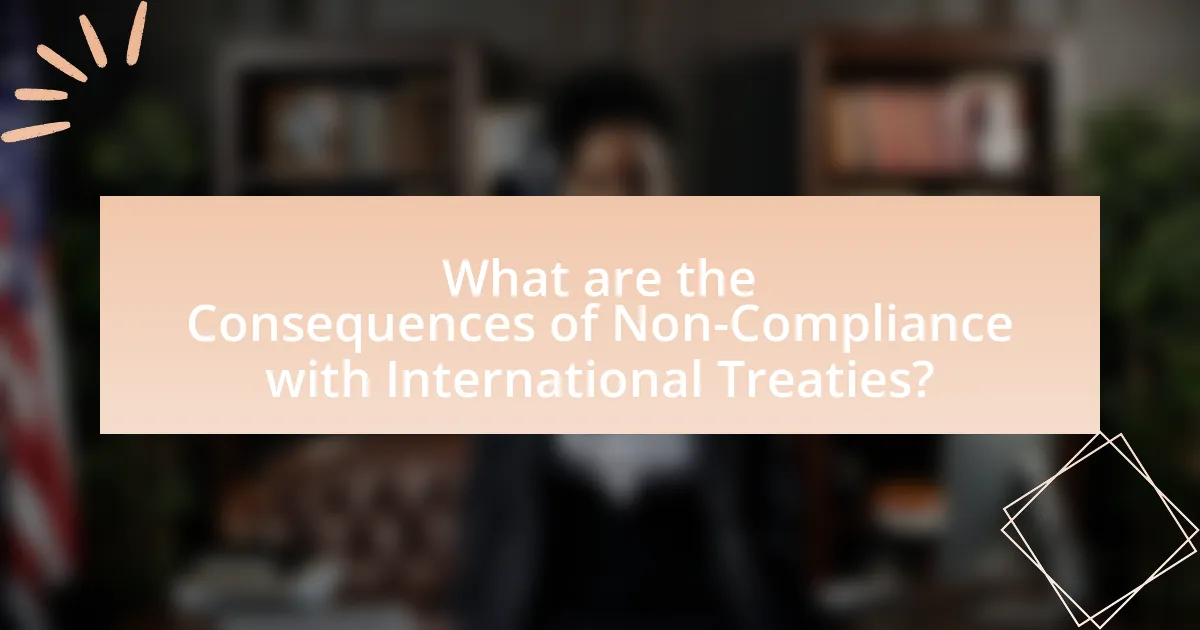International treaties are formal agreements between countries that establish legally binding obligations and standards, particularly in the realm of human rights. This article examines the role of these treaties in promoting and protecting human rights, detailing how they influence local practices, establish obligations for signatory states, and empower local organizations. It also addresses the challenges faced in implementing these treaties, including cultural differences and political will, while highlighting the consequences of non-compliance. Furthermore, the article discusses best practices for enhancing the impact of international treaties on local human rights, emphasizing the importance of education, stakeholder engagement, and collaboration between local and international organizations.

What are International Treaties and Their Role in Human Rights?
International treaties are formal agreements between countries that establish legally binding obligations and standards, including those related to human rights. These treaties play a crucial role in promoting and protecting human rights by setting international norms that member states are expected to uphold, such as the Universal Declaration of Human Rights and the International Covenant on Civil and Political Rights. By ratifying these treaties, countries commit to implementing their provisions domestically, which can lead to improved human rights practices and accountability mechanisms. For example, the Convention on the Elimination of All Forms of Discrimination Against Women has led to significant legal reforms in many countries, enhancing women’s rights and protections.
How do international treaties influence local human rights practices?
International treaties influence local human rights practices by establishing legal frameworks that obligate countries to adhere to specific human rights standards. These treaties, such as the International Covenant on Civil and Political Rights, create binding commitments for signatory states, compelling them to align their domestic laws and policies with international norms. For instance, after ratifying the Convention on the Elimination of All Forms of Discrimination Against Women, many countries have enacted legislation to improve gender equality, demonstrating a direct impact on local practices. Additionally, the monitoring mechanisms associated with these treaties, such as periodic reviews by international bodies, hold governments accountable, further reinforcing the implementation of human rights standards at the local level.
What are the key principles of international human rights treaties?
The key principles of international human rights treaties include universality, non-discrimination, accountability, and participation. Universality asserts that human rights apply to all individuals regardless of nationality, ethnicity, or status, as established in the Universal Declaration of Human Rights. Non-discrimination mandates that all individuals are entitled to rights without discrimination of any kind, which is reinforced by treaties like the International Covenant on Civil and Political Rights. Accountability ensures that states are held responsible for violations of human rights, supported by mechanisms such as the International Criminal Court. Participation emphasizes the importance of involving individuals and communities in the decision-making processes that affect their rights, as highlighted in the Convention on the Rights of Persons with Disabilities. These principles collectively guide the implementation and enforcement of human rights standards globally.
How do treaties establish obligations for signatory states?
Treaties establish obligations for signatory states through formal agreements that create legally binding commitments under international law. When states sign and ratify a treaty, they consent to adhere to its provisions, which often include specific duties related to human rights, environmental protection, or trade regulations. For example, the International Covenant on Civil and Political Rights obligates signatory states to respect and ensure the rights outlined within the covenant, thereby creating enforceable responsibilities. This binding nature is reinforced by the principle of pacta sunt servanda, which asserts that agreements must be kept, thus ensuring that states are held accountable for their treaty obligations in international forums and domestic legal systems.
Why are international treaties important for human rights advocacy?
International treaties are crucial for human rights advocacy because they establish binding legal standards that countries must adhere to, promoting accountability and protection of individual rights. These treaties, such as the Universal Declaration of Human Rights and the International Covenant on Civil and Political Rights, provide a framework for monitoring compliance and addressing violations. For instance, the enforcement mechanisms of these treaties, including periodic reviews and reporting obligations, compel nations to improve their human rights practices. Additionally, international treaties facilitate cooperation among states and civil society, fostering a global dialogue on human rights issues and encouraging local advocacy efforts.
What impact do treaties have on national legislation?
Treaties significantly influence national legislation by requiring countries to align their laws with international obligations. When a nation ratifies a treaty, it commits to implementing its provisions domestically, which often leads to the amendment or creation of laws that reflect the treaty’s standards. For example, the Convention on the Rights of the Child has prompted numerous countries to revise their child protection laws to comply with its requirements, demonstrating how international agreements can directly shape local legal frameworks.
How do treaties empower local human rights organizations?
Treaties empower local human rights organizations by providing a legal framework that obligates states to uphold human rights standards. This legal obligation enables local organizations to hold governments accountable for violations, as treaties often include mechanisms for reporting and monitoring compliance. For instance, the International Covenant on Civil and Political Rights (ICCPR) allows organizations to submit information to the Human Rights Committee, thereby amplifying their voices and concerns on a global platform. Additionally, treaties can facilitate access to international funding and support, enhancing the capacity of local organizations to advocate for human rights effectively.

What Challenges Do Local Practices Face in Implementing International Treaties?
Local practices face significant challenges in implementing international treaties, primarily due to discrepancies between international standards and domestic laws. These discrepancies often arise from differing cultural, legal, and political contexts that can hinder compliance. For instance, a study by the United Nations Development Programme highlights that local legal frameworks may not align with the obligations set forth in international human rights treaties, leading to gaps in enforcement and protection. Additionally, limited resources and lack of training for local authorities can impede effective implementation, as seen in various countries where financial constraints restrict the ability to uphold treaty obligations. Furthermore, resistance from local stakeholders, who may view international treaties as foreign impositions, can create barriers to acceptance and integration into local practices.
What are the common barriers to effective implementation of treaties?
Common barriers to effective implementation of treaties include lack of political will, insufficient resources, and inadequate legal frameworks. Political will is crucial, as governments may prioritize national interests over treaty obligations, leading to non-compliance. Insufficient resources, such as funding and personnel, hinder the capacity to enforce treaty provisions effectively. Additionally, inadequate legal frameworks can create gaps in domestic law that prevent the full realization of treaty commitments. For instance, a study by the United Nations Development Programme highlights that countries with weak legal systems often struggle to implement human rights treaties, resulting in persistent violations.
How do cultural differences affect treaty compliance?
Cultural differences significantly affect treaty compliance by influencing how nations interpret and implement international agreements. For instance, varying cultural values can lead to different priorities in human rights, resulting in selective adherence to treaty obligations. Research by the United Nations Development Programme indicates that countries with strong cultural norms around community and collectivism may prioritize social stability over individual rights, impacting their compliance with treaties that emphasize personal freedoms. Additionally, cultural perceptions of authority and governance can shape the willingness of states to enforce treaty provisions, as seen in the varying responses to the Convention on the Rights of the Child across different cultural contexts.
What role does political will play in the implementation process?
Political will is crucial in the implementation process of international treaties, as it determines the commitment of government officials to prioritize and enforce human rights standards. When political leaders demonstrate strong support for human rights initiatives, it often leads to the allocation of necessary resources, the establishment of relevant policies, and the mobilization of public and institutional support. For instance, countries that ratified the Convention on the Rights of the Child often saw improvements in child welfare policies, reflecting the political commitment to uphold the treaty’s principles. Conversely, a lack of political will can result in inadequate enforcement and neglect of treaty obligations, undermining the effectiveness of international human rights frameworks.
How do local legal frameworks interact with international treaties?
Local legal frameworks interact with international treaties through a process of incorporation and implementation, where domestic laws are aligned with international obligations. This interaction can occur in various ways, such as through legislative amendments, judicial interpretations, or executive actions that reflect treaty commitments. For example, countries that ratify human rights treaties often enact laws that promote the rights outlined in those treaties, thereby ensuring compliance with international standards. Additionally, courts may interpret local laws in light of international obligations, reinforcing the principles established by treaties. This dynamic relationship is crucial for the effective realization of human rights at the local level, as it ensures that international norms are integrated into national legal systems.
What are the differences between domestic and international law regarding human rights?
Domestic law regarding human rights is created and enforced by individual countries, while international law is established through treaties and agreements between nations. Domestic law varies significantly from one country to another, reflecting local values, cultures, and legal systems, whereas international law aims to create universal standards for human rights that all signatory states are expected to uphold. For example, the Universal Declaration of Human Rights, adopted by the United Nations in 1948, serves as a foundational international document, but its implementation relies on domestic legal frameworks, which can differ widely in their effectiveness and scope. This disparity can lead to situations where a country may ratify international treaties but fail to incorporate those standards into its domestic law, resulting in inconsistent human rights protections.
How can local courts influence the application of international treaties?
Local courts can influence the application of international treaties by interpreting and enforcing these treaties within their jurisdiction. When local courts apply international treaties, they can shape domestic law and human rights practices by integrating international standards into local legal frameworks. For instance, in cases like the U.S. Supreme Court’s decision in Sosa v. Alvarez-Machain (2004), the court recognized the applicability of customary international law, demonstrating how local courts can uphold international norms. This integration can lead to enhanced protection of human rights at the local level, as courts may rely on international treaties to adjudicate cases involving human rights violations, thereby reinforcing the principles enshrined in those treaties.

What are the Consequences of Non-Compliance with International Treaties?
Non-compliance with international treaties can lead to significant diplomatic, legal, and economic consequences for states. Diplomatic repercussions may include strained relations with other countries, loss of credibility, and potential isolation in international forums. Legally, non-compliance can result in disputes brought before international courts, such as the International Court of Justice, where states may face rulings against them. Economically, sanctions or trade restrictions may be imposed by other nations or international bodies, impacting a country’s economy. For instance, the United Nations has imposed sanctions on countries like North Korea for failing to comply with international agreements regarding nuclear weapons. These consequences underscore the importance of adherence to international treaties in maintaining global order and protecting human rights.
What are the potential repercussions for countries that fail to comply?
Countries that fail to comply with international treaties on human rights may face sanctions, diplomatic isolation, and loss of credibility on the global stage. Non-compliance can lead to economic penalties imposed by other nations or international bodies, such as the United Nations, which may restrict trade or financial aid. For instance, the U.S. has historically applied sanctions against countries like North Korea and Iran for human rights violations, impacting their economies significantly. Additionally, non-compliant countries may experience increased scrutiny from international organizations, leading to potential interventions or resolutions condemning their actions. This can further exacerbate their isolation and hinder their ability to engage in international relations effectively.
How do international bodies respond to non-compliance?
International bodies respond to non-compliance by implementing a range of measures, including diplomatic pressure, sanctions, and legal actions. For instance, the United Nations may issue resolutions condemning non-compliance, while the International Criminal Court can pursue prosecutions against individuals for violations of international law. Additionally, organizations like Amnesty International and Human Rights Watch often document and publicize instances of non-compliance, which can lead to increased scrutiny and pressure from the international community. These responses aim to uphold international standards and encourage adherence to treaties that protect human rights.
What impact does non-compliance have on local human rights conditions?
Non-compliance with international human rights treaties significantly deteriorates local human rights conditions. When states fail to adhere to their treaty obligations, violations such as torture, discrimination, and suppression of free speech often increase. For instance, the United Nations Human Rights Council reported that countries with poor compliance records frequently experience heightened civil unrest and human rights abuses, as seen in nations like Syria and Venezuela, where non-compliance has led to widespread violence against civilians and systemic oppression. This evidence underscores the direct correlation between non-compliance and the degradation of human rights at the local level.
How can local communities advocate for better adherence to treaties?
Local communities can advocate for better adherence to treaties by organizing grassroots campaigns that raise awareness about treaty obligations and their implications for human rights. These campaigns can include educational workshops, community meetings, and partnerships with local NGOs to inform residents about their rights under international treaties. For instance, the Universal Declaration of Human Rights outlines fundamental rights that local communities can reference to hold governments accountable. Additionally, communities can engage in dialogue with local authorities, urging them to implement treaty provisions effectively. Evidence shows that active community involvement has led to improved compliance with treaties, as seen in the case of the Convention on the Rights of the Child, where local advocacy efforts resulted in enhanced child protection policies in various countries.
What strategies can be employed to raise awareness about treaty obligations?
To raise awareness about treaty obligations, educational campaigns targeting various stakeholders, including government officials, civil society organizations, and the general public, can be employed. These campaigns can utilize workshops, seminars, and informational materials to explain the significance of treaties and their implications for human rights practices at the local level. For instance, the United Nations has successfully implemented similar strategies through its Human Rights Education program, which emphasizes the importance of understanding international treaties to promote compliance and accountability. Additionally, leveraging social media platforms can enhance outreach and engagement, allowing for broader dissemination of information regarding treaty obligations and their relevance to local communities.
How can grassroots movements influence policy changes related to treaties?
Grassroots movements can influence policy changes related to treaties by mobilizing public support, raising awareness, and advocating for specific policy reforms. These movements often engage in campaigns that highlight the implications of treaties on local human rights practices, thereby pressuring policymakers to consider the voices of affected communities. For instance, the global climate justice movement has successfully pushed for stronger commitments to environmental treaties by demonstrating the adverse effects of climate change on marginalized populations. This mobilization is supported by data showing that public opinion can significantly sway legislative agendas, as seen in the 2015 Paris Agreement negotiations, where grassroots advocacy played a crucial role in shaping national commitments.
What Best Practices Can Enhance the Impact of International Treaties on Local Human Rights?
Best practices that can enhance the impact of international treaties on local human rights include effective domestic implementation, stakeholder engagement, and continuous monitoring and evaluation. Effective domestic implementation ensures that international obligations are translated into national laws and policies, which is crucial for enforcement. For instance, countries that have integrated the Convention on the Rights of the Child into their legal frameworks have seen improvements in child welfare indicators. Stakeholder engagement, particularly involving civil society organizations, allows for diverse perspectives and accountability, as evidenced by the role of NGOs in monitoring compliance with the Universal Periodic Review process. Continuous monitoring and evaluation provide feedback mechanisms that help identify gaps and successes in human rights practices, as demonstrated by the periodic reporting requirements established by various human rights treaties. These practices collectively strengthen the alignment between international standards and local realities, thereby enhancing the overall effectiveness of human rights treaties.
How can collaboration between local and international organizations improve outcomes?
Collaboration between local and international organizations can significantly improve outcomes by leveraging diverse resources, expertise, and networks to address complex human rights issues. Local organizations possess in-depth knowledge of the cultural and social dynamics within their communities, while international organizations bring global perspectives, funding, and advocacy capabilities. For instance, a study by the United Nations Development Programme highlighted that partnerships between local NGOs and international bodies led to a 30% increase in the effectiveness of human rights initiatives in various regions. This synergy enables the development of tailored strategies that are culturally relevant and more likely to succeed in promoting human rights practices.
What role does education play in promoting treaty compliance at the local level?
Education plays a crucial role in promoting treaty compliance at the local level by enhancing awareness and understanding of international human rights obligations among community members. When individuals are educated about the specific rights and protections afforded by treaties, they are more likely to advocate for their enforcement and hold local authorities accountable. For instance, studies have shown that educational programs focused on human rights can lead to increased civic engagement and participation in local governance, thereby fostering a culture of compliance with international standards. Furthermore, initiatives that incorporate local contexts into human rights education can effectively bridge the gap between international norms and local practices, ensuring that communities not only recognize their rights but also understand the mechanisms available for their protection.